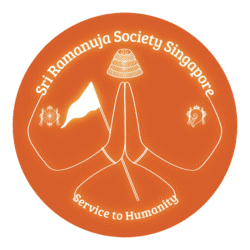
PC: VedicFeed
Who is Sri Ramanuja?
Sri Ramanuja (1017–1137 CE) was a great philosopher, spiritual teacher, and social reformer of India. He became one of the most important acharyas (spiritual masters) in the history of Sanatana Dharma (Hinduism). His teachings continue to guide millions of people even today.
His Life
He was born in Sriperumbudur, near modern-day Chennai in Tamil Nadu, India. From an early age, he showed immense interest in spirituality and Vedic studies. Born as Ilaya Perumal, he later earned the title Ramanujacharya, meaning “the disciple or younger brother of Rama.”
He was initially trained in Advaita Vedanta under Yadava Prakasha, but philosophical differences led him to form his understanding of Vedanta, which became known as Vishishtadvaita (qualified non-dualism).
About Vishishtadvaita Vedanta
Sri Ramanuja’s primary philosophical contribution, Vishishtadvaita Vedanta, means “qualified non-dualism.” This philosophy teaches that God, souls, and the world are all real and interconnected, with God as the supreme being who lovingly supports everything.
It is a school of thought that teaches:
- Brahman (God) is both the material and efficient cause of the universe.
- Jiva (the soul) and prakriti (the material world) are real and distinct, yet they are inseparable attributes of Brahman.
- God is personal and compassionate.
- Anyone, regardless of background, can worship God through bhakti (devotion) and attain moksha (spiritual liberation).

PC: Temple Purohit
His Vision
Sri Ramanuja did much more than teach philosophy. His life was an example of devotion, service, and humility.
- Spiritual Teacher: He authored Sri Bhashya, a detailed commentary on the Brahma Sutras, laying out his Vishishtadvaita interpretation. His other important works include Vedartha Sangraha, Gita Bhashya (commentary on the Bhagavad Gita), and Vedanta Deepa.
- Temple Reformer: At the great temple of Srirangam, he organised rituals, improved temple management, and made it a centre for learning and devotion. He ensured that all sincere devotees were welcomed, regardless of caste or status, promoting social inclusivity.
- Voice of Inclusion: He believed that everyone is equal in the eyes of God. His message of universal love and equality remains one of his greatest contributions to society.
- Cultural Integration: He honoured the Tamil Alwars and their devotional hymns (Divya Prabandham), unifying Sanskrit and Tamil traditions. He also helped bridge the gap between Agama (temple rituals) and Vedantic philosophy, giving a practical and devotional expression to Sanatana Dharma.
His Legacy
Sri Ramanuja’s teachings help us to see the divine in everyone and serve with love and respect. He showed that:
- Devotion and kindness are more important than ritual or status, the very heart of Sanatana Dharma.
- Knowledge and love of God can bring peace to both our hearts and our society.
- Every person has the right to seek and experience God.
In 2017, on his 1000th birth anniversary, a grand statue called the “Statue of Equality” was inaugurated near Hyderabad, India, to honour his enduring legacy.

PC: The India
For our Society
The Sri Ramanuja Society Singapore is inspired by his vision of devotion, service, and unity. We welcome all who wish to learn about his life, follow his teachings, and grow in spiritual understanding.
Whether you are a child learning your first prayer or an adult exploring deeper meanings in the scriptures, Sri Ramanuja’s path lights the way, with wisdom, love, and equality.

No responses yet